Medium
2w
129

Image Credit: Medium
The Future of Hybrid Cloud in Financial Services: Balancing Flexibility and Control
- The financial services industry is facing digital challenges, requiring a balance between innovation and regulatory requirements.
- Hybrid cloud is seen as a solution that combines the benefits of public cloud scalability with private infrastructure control.
- It offers a middle ground for modernization without compromising governance needs in the financial sector.
- Hybrid cloud integrates private, public, and on-premises infrastructure to create a unified environment.
- Financial institutions can maintain sensitive data in secure, private environments while leveraging public cloud flexibility for less sensitive tasks.
- Hybrid cloud is a deliberate long-term strategy, not just a step towards full cloud migration for industries with complex needs.
- Challenges of hybrid cloud adoption exist alongside benefits such as total cost optimization.
- Technological advancements will shape the future of hybrid cloud in financial services.
- Some major financial institutions are already leading in hybrid cloud adoption, highlighting its strategic importance.
- The financial sector is transitioning towards being cloud-smart, choosing cloud models based on workload needs and regulatory compliance.
- Key trends include a focus on security risk models and the combination of public cloud innovation with private infrastructure control.
- Hybrid cloud enables financial services to adapt to customer expectations, technological demands, and regulatory pressures for a more competitive future.
- By balancing flexibility and control, hybrid cloud is allowing financial firms to envision new possibilities and enhance competitiveness.
Read Full Article
7 Likes
For uninterrupted reading, download the app